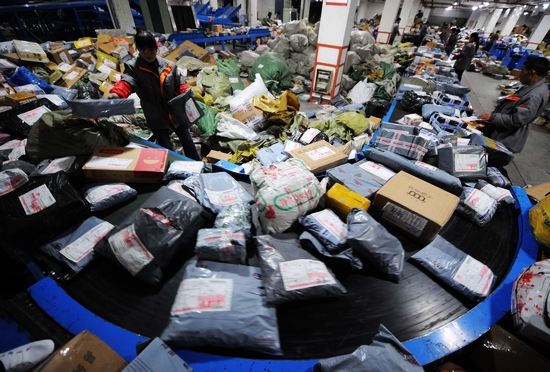是誰(shuí)讓快遞變成了“慢遞”?
|

At least 30 percent of express packages are in logistics storage warehouses and will not be delivered on time, Xinhua reported, adding that express delivery is turning into snail delivery.?
|
新華社消息,目前至少30%的快件積壓在物流倉(cāng)庫(kù)中無(wú)法及時(shí)送出,快遞成了“蝸牛遞”。
這場(chǎng)快遞擁堵是由網(wǎng)購(gòu)量暴增引起的,目前網(wǎng)購(gòu)包裹占到國(guó)內(nèi)快遞業(yè)務(wù)量的60%。近期的柴油短缺以及北方糟糕的天氣狀況更是讓本已超載運(yùn)轉(zhuǎn)的快遞業(yè)雪上加霜。
國(guó)內(nèi)研究公司易觀國(guó)際的一位研究員稱:“中國(guó)物流業(yè)的發(fā)展落后于快速發(fā)展的電子商務(wù),要解決這一問(wèn)題得花上3到5年時(shí)間。”
A long wait for the postman
At least 30 percent of express packages are in logistics storage warehouses and will not be delivered on time, Xinhua reported, adding that express delivery is turning into snail delivery.
The delivery backlog has been caused by a surge in online shopping orders, which account for 60 percent of parcel deliveries. The recent shortage of diesel oil and bad weather conditions in northern China, have compounded the problems of an already overloaded express delivery market.
"China's logistics industry hasn't caught up with the rapid development of e-commerce," said an analyst with domestic research company Analysys International. "It may take three to five years for the industry to solve the problem."
(China.org.cn December 15, 2010)